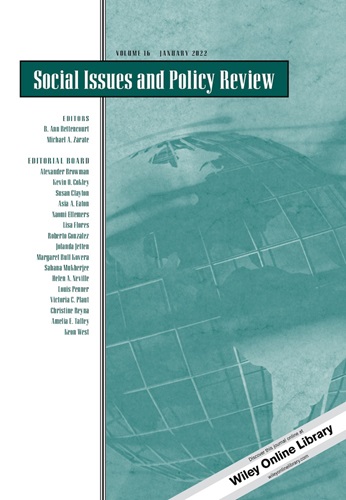社会群体对退休调整的重要性:身份变化的社会认同模型的证据、应用与政策启示
IF 5.6
1区 心理学
Q1 PSYCHOLOGY, SOCIAL
引用次数: 63
摘要
先前在社会身份传统方面的工作表明,对重大生活变化的适应,包括积极的(例如,成为新父母)和消极的(例如经历中风),都可以通过访问社会群体网络来支持。这是身份改变的社会身份模型(SIMIC)的基础,该模型认为,在生活转变的背景下,幸福感和适应能力得到了增强,人们能够保持对自己重要的原有社会群体成员身份,或者获得新的成员身份。基于在各种人生转变背景下研究这些问题的实证工作,我们概述了SIMIC与一个特定人生转变的相关性:退休。我们确定了四个关键经验教训,说明了在向劳动力退休过渡期间有效管理社会群体资源的重要性。这些结果表明,退休人员对退休的调整得到了加强:(1)可以获得多个重要的群体成员及其提供的心理资源,(2)保持积极和有价值的现有群体,(3)发展有意义的新群体,(4)前提是他们彼此兼容。这一理论和经验证据被用来引入一种新的社会干预,即第4组健康,将SIMIC的经验教训转化为实践。该计划旨在引导人们发展和嵌入他们的社会群体关系,以保护他们的健康和福祉,在许多人退休后经历的重大生活变化时期。本文章由计算机程序翻译,如有差异,请以英文原文为准。
The Importance of Social Groups for Retirement Adjustment: Evidence, Application, and Policy Implications of the Social Identity Model of Identity Change
Previous work in the social identity tradition suggests that adjustment to significant life changes, both positive (e.g., becoming a new parent) and negative (e.g., experiencing a stroke), can be supported by access to social group networks. This is the basis for the social identity model of identity change (SIMIC), which argues that, in the context of life transitions, well-being and adjustment are enhanced to the extent that people are able to maintain preexisting social group memberships that are important to them or else acquire new ones. Building on empirical work that has examined these issues in the context of a variety of life transitions, we outline the relevance of SIMIC for one particular life transition: retiring from work. We identify four key lessons that speak to the importance of managing social group resources effectively during the transition to retirement from the workforce. These suggest that adjustment to retirement is enhanced to the extent that retirees: (1) can access multiple important group memberships and the psychological resources they provide, (2) maintain positive and valued existing groups, and (3) develop meaningful new groups, (4) providing they are compatible with one another. This theory and empirical evidence is used to introduce a new social intervention, Groups 4 Health, that translates SIMIC's lessons into practice. This program aims to guide people through the process of developing and embedding their social group ties in ways that protect their health and well-being in periods of significant life change of the form experienced by many people as they transition into retirement.
求助全文
通过发布文献求助,成功后即可免费获取论文全文。
去求助
来源期刊

Social Issues and Policy Review
Multiple-
CiteScore
22.20
自引率
1.10%
发文量
9
期刊介绍:
The mission of Social Issues and Policy Review (SIPR) is to provide state of the art and timely theoretical and empirical reviews of topics and programs of research that are directly relevant to understanding and addressing social issues and public policy.Papers will be accessible and relevant to a broad audience and will normally be based on a program of research. Works in SIPR will represent perspectives directly relevant to the psychological study of social issues and public policy. Contributions are expected to be review papers that present a strong scholarly foundation and consider how research and theory can inform social issues and policy or articulate the implication of social issues and public policy for theory and research.
 求助内容:
求助内容: 应助结果提醒方式:
应助结果提醒方式:


